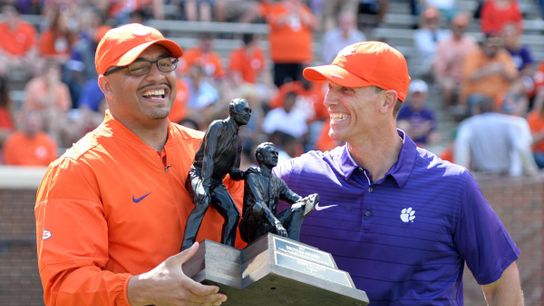Dabo Swinney's climb to greatness at Clemson was not a straight upward line like that of Nick Saban at Alabama or Urban Meyer at Ohio State.
Even discounting his 4-3 mark as an interim, Dabo got off to a (relatively) slow start as the top Tiger: he was 15-12 in his first two seasons as the full-time head coach, and 25-16 through his first three. Though he did lead Clemson to the ACC championship in 2011 -- its first in two full decades -- the warm fuzzies from that title lasted as long as a car wash the day before a thunderstorm. West Virginia humiliated Clemson in the 2012 Orange Bowl 70-33, a game that began with Swinney saying, "Hopefully when this thing's over people are going to be talking about the Clemson defense."
https://www.youtube.com/watch?v=TsecYJ3338s
Awful as that game was, it ended up being the best thing that could have happened to the program.
Chad Morris was already on staff as offensive coordinator, and the 70-point shellacking allowed Swinney to make a similar hire on the defensive side, pulling Brent Venables away from Oklahoma.
The line has pointed straight upward from there: 87-11 with four ACC championships, four College Football Playoff trips, five AP Top 10 finishes, two national titles and the first 15-0 season in college football's modern history. While that 2011 Clemson team finished 81st nationally in scoring defense, Venables' units have ranked 46th, 3rd, 24th, 10th, 2nd and 1st.
Unlike Saban at Alabama or Meyer at Ohio State, the Clemson formula has been built upon continuity. Clemson keeps its top assistants, and it does so by A) creating an environment where people want to stick around and B) paying them best-in-market rates. A and B might seem redundant, but they're not. Saban's staff turns over year after year after year, and it's not because Alabama can't pay them.
Clemson paid Morris a best-in-the-nation $1.3 million salary in 2012, and last summer gave Venables the biggest assistant coaching contract in college football history: $11.6 million over five years, all of it basically guaranteed. (While his annual salary is below that of LSU's Dave Aranda, the total value of the deal exceeds Aranda's 4-year, $10 million contract.)
On Friday, Clemson hit another milestone for assistant coaching compensation. According to The State, Clemson's Board of Trustees has approved across-the-board raises for Swinney's staff and in the process pushed both co-offensive coordinators Tony Elliott and Jeff Scott to the $1 million mark.
Scott has been on Swinney's staff since 2008, while Elliott jumped aboard in 2011. The pair have co-piloted the Tigers' attack since Morris departed for SMU ahead of the 2015 season, and in 2018 they made identical $850,000 salaries, meaning the title run was worth 17 percent raises.
With Venables -- whose salary remains unchanged at $2.2 million -- Elliott and Scott now in the 7-figure club, Clemson becomes the second college football program to pay three assistant coaches at least $1 million a year. Michigan became the first in 2017 when Don Brown, Tim Drevno and Pep Hamilton each earned $1 million, though the latter two are no longer employed by the school.
Here's how the full staff salaries will look in 2019, according to The State:
* - Scheduled for raise to $2.4 million in 2020, 2021 and 2022, per contract.
It's hard to make the case anyone on this staff is underpaid when the low man on the totem pole makes $350,000, but, when looking at the rest of the market compared against their performance, one can argue Bates and Hall are still among the most underpaid coaches in college football.
As always, stay tuned to The Scoop for the latest.
